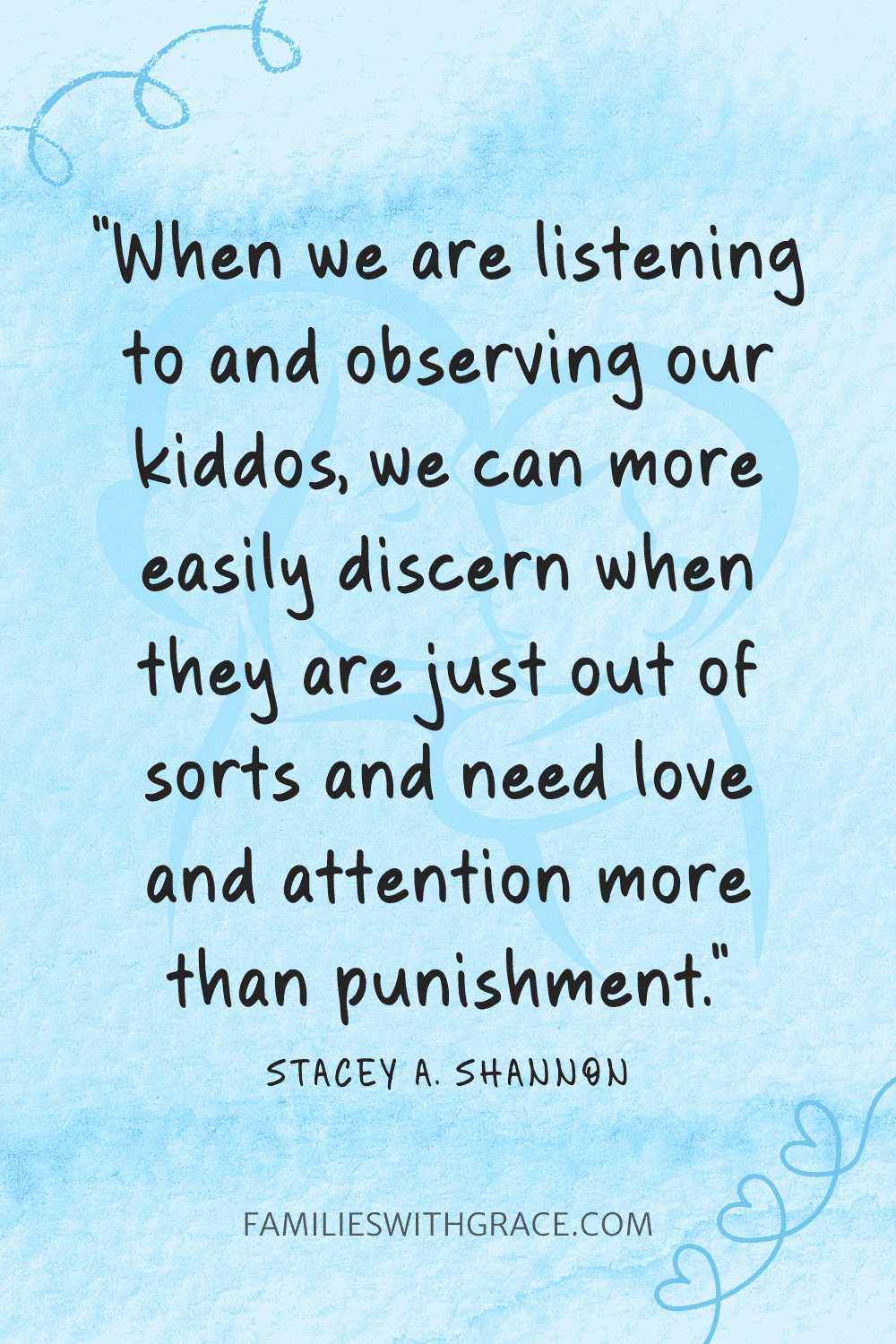What being a grace-filled parent looks like
When I learned I was pregnant with my first child, I was excited. I was also overwhelmed and nervous. Some people are just naturally great with all kids. (In fact, that same first child of mine is that way!) I was never that way. I was not sure what motherhood would actually be like, but I was excited to be part of it. Not once did I think about how grumpy I’d be with my baby. Instead, I planned to be a grace-filled parent. I planned to be calm, have a sense of humor and show lots of love.

The reality of parenthood sets in quickly. Those first few months were exhausting and an adjustment beyond anything I could ever have prepared for. Parenthood is a total upheaval of life. Added to the exhaustion is stress and pressure and it’s a perfect mix for cranky parents. But none of us what to be those cranky parents. We desire to be a grace-filled parent who is patient, caring and loving.
I’ve never been a perfect parent, just as I’m not a perfect person. I have stories about my behavior that make me cringe and feel ashamed. However, I’ve also worked (and had God work in me!) to become a more grace-filled parent. I’ve learned through my years as a mom that my kids need grace from me as much as I need grace from them. Today I’m sharing 10 lessons I’ve learned about how to be a more grace-filled parent.
1. Listen to your children.
From the time they are babies, our kids are using their voices to tell us what is going on with them. True, they start out with crying that can be perplexing. (I remember the days of trying to sort out what could possibly be making my baby unhappy when they were clean, fed and well rested and still crying sometimes!) But once they start talking and expressing themselves, we get to learn about them and their point-of-view.
Understanding where they’re coming from can help you have more patience with your kiddos and give them more grace as a result. I remember when my daughter was 3 and spilled an almost full bottle of hand soap on the hallway carpet. I was angry that she’d made a mess and didn’t understand why in the world she was carrying the soap dispenser out of the bathroom. She explained to me that she wanted to show our new Minnie Mouse soap dispenser to the Minnie Mouse toys in her bedroom. Oh my heart!
She still got in some trouble, and we definitely talked about how soap dispensers stay in the bathroom, but her punishment wasn’t as severe because I understood where she was coming from. She wasn’t just carrying around soap for no reason and trying to make a mess. Listening to her helped me understand her and address what was really going on.
2. Observe your kids.
But, kids don’t always express themselves with words. Sometimes their feelings are too big or they just plain don’t have the words. I mean, I’m just over four decades into my own life and still can struggle to find the right words to explain how I’m feeling sometimes! Sometimes we need to stop and observe our kids to figure out what is really going on with them and why they are behaving a certain way.
Recently my parents were in town for a visit. (They moved away last winter.) We made a quick trip to the grocery store for just a couple of things. My son stood in the chip aisle and argued with me for a moment about buying Cheetos. I get it. I love Cheetos, too, but I told him we had some at home and to stop being difficult. Indeed I was frustrated. Later that evening, my dad mentioned to me that my son had noticed all the rest of us had picked up some sort of snack or something to purchase and seemed to be feeling left out. It made perfect sense as I looked back on the situation. I wasn’t a very grace-filled parent in that moment, but I did at least understand my son a bit. He never said he was feeling left out; however, his actions told the story if I’d have just paid closer attention.
No matter what, of course my son shouldn’t be allowed to argue with me. If I had realized what was really going on with him at the time, though, I could have reacted differently and resolved the situation in another way. I could have suggested he pick another snack instead. Just two minutes after the Cheeto disagreement, I did concede to getting a box of Cheez-Its at my son’s request that both my kids love. His attitude disappeared after that.
3. Communicate with your kids.
Another way to be a more grace-filled parent is to communicate with your kids. Listen, my kids talk a lot. A lot. But, what I mean is to actually communicate with them. Let them know what plans are for after school or what you expect from them on an outing. Just a few sentences ahead of time can help them also understand you better and allow you both to have more patience with and grace for each other. It helps you avoid yelling at your kids or getting otherwise upset with them.
For example, as my children have gotten older, they have had more plans for what they want to do during their downtime. My daughter may be planning to come home after school and spend a couple of hours writing. Or my son might be looking forward to playing with a friend in the neighborhood when he gets home on a nice day. If I throw a wrench into their plans with an extra activity, that can lead to grumpy attitudes at the least and meltdowns at the worst. Simply communicating about plans ahead of time helps tremendously.
My husband and I also talk with our kids about why they are being punished or when we observe a behavior we don’t like. Of course there are times they get in trouble immediately, but other times we have found it’s helpful to communicate with them about why we are unhappy with what’s happened. Communication really does go a long way!

4. Know when to discipline and when to hug.
The definition of grace is not getting what you deserve. Meaning if I do something wrong, you show me kindness instead of anger. Being a grace-filled parent means that sometimes when our kids do something wrong, we let it slide or give them a hug instead of a punishment.
I mentioned in point two that my parents moved away last winter. Their move a few states away has been a big adjustment for all of us. So when they headed back out after visiting us recently and my youngest had a difficult attitude the next day, I gave him a bit of grace. He needed grace and love more than discipline in that moment.
When we are listening to and observing our kiddos, we can more easily discern when they are just out of sorts and need love and attention more than punishment.
5. Remember that you are a teacher.
One of the biggest jobs we have as parents is to be our kids’ teacher. We teach them everything they know about navigating life through our words and actions. Remembering that we are teaching them is an important part of being a grace-filled parent. Our kids are still growing and learning. If we take the time to teach them rather than just get mad at them, we’re all happier in the end.
Our goal is to help them grow and learn. Growing and learning are difficult when we’re being yelled at or in trouble. Instead, use some mistakes as teaching moments. I’ve also learned to expect that I will have to repeat myself and repeat lessons. My kids are kids. They aren’t perfect and they’re not going to always remember what to do in a moment.
6. Set realistic expectations.
When I expect more from my kids than they are capable of, then I lose my patience and my feelings of grace. One trick I’ve learned is to remind myself how old my kids are when I start to impose unrealistic expectations on them. If I stop to think that my daughter is only 12 or my son is only 9 when they mess up, then I can realize when I’m expecting them to act like adults.
I also set expectations out loud to my kids when we are going into situations. For example, if we are going to visit a friend, I remind them I expect them to help clean up toys and not give me a hard time when I say it’s time to leave. When they know what I expect of them, they are more likely to behave accordingly.
7. Guard your time.
I cannot say enough how important guarding your time is. I’m an introvert, so finding downtime comes naturally to me. Both introverts and extroverts need to be wary of overscheduling. Who can be a grace-filled parent when you are stressed out trying to get everyone in multiple places at the same time every night of the week? (Maybe some of you can, and that’s awesome. But I know I sure can’t, and I don’t think I’m alone.)
I’d rather say no to an activity than lose my patience with my kids. We started in elementary school with the rule our kids can do only one regular activity per week. That changes as they get older and can both handle more and stay up later. But it’s what works best for us, and I gladly stick to it.
8. Have fun together.
Eight months old. That’s the age that babies start getting more interactive and you can have a bit of fun with them. (Or at least that was our experience.) From that point on, find ways to have fun with your kiddos. Do things they enjoy with them and let yourself go and enjoy them, too. Now that our kids are older, we enjoy playing games together. When we go to the playground, I swing with the kiddos (unless the swings are busy or other kids want to swing). Just have fun.
We are much more inclined to give grace when our children need it when we have good feelings of making good memories with them. Find ways to sincerely enjoy spending time with your kiddos. Parenting is a lot of work and requires a lot of us, but don’t forget to enjoy moments along the way!

9. Ask for help.
Another important thing to remember about being a grace-filled parent is that you aren’t meant to do it alone. Start always with asking God for help. I pray daily to be the mom my children need. In fact, this parents’ prayer is a great place to start.
Other times you need to ask for help from those around you: your spouse, your extended family, friends and even your kids! For example, I am the one mostly in charge of laundry in our family. Sometimes I get overwhelmed, more frustrated and certainly less grace-filled when I am sitting with a pile of laundry surrounding me that needs to be folded. I’ve learned to make laundry a family chore. I get it gathered, washed and dried, then we all fold it together and everyone is responsible for putting away his or her clothes.
10. Apologize when you mess up.
Being a grace-filled parent doesn’t mean you always have it together. You aren’t perfect. Along the way, you’re going to mess up. Let your kids see what it looks like to mess up gracefully. Apologize to them when you are wrong, because sometimes you are. I have gotten short with my kids for no good reason other than being tired or cranky or whatever. And then I tell them I’m sorry. I want to model asking for forgiveness for them as well as reminding them none of us are perfect.
Looking for more grace-filled posts? Don’t miss these!







